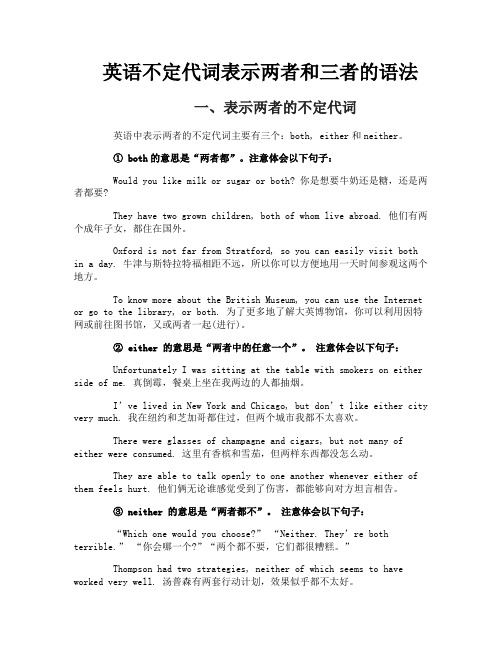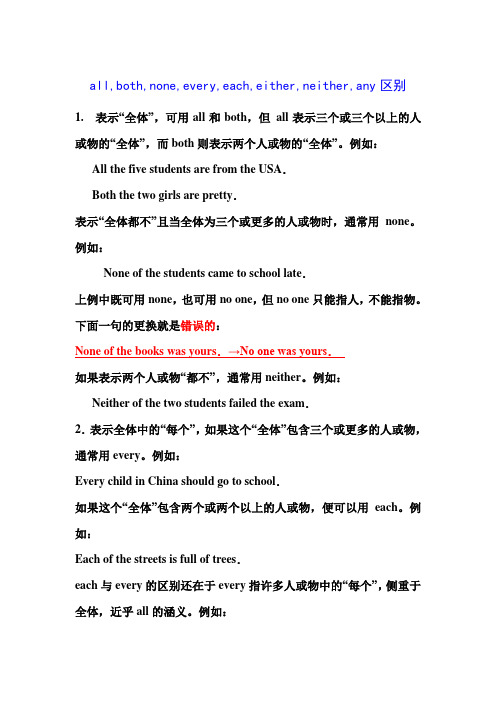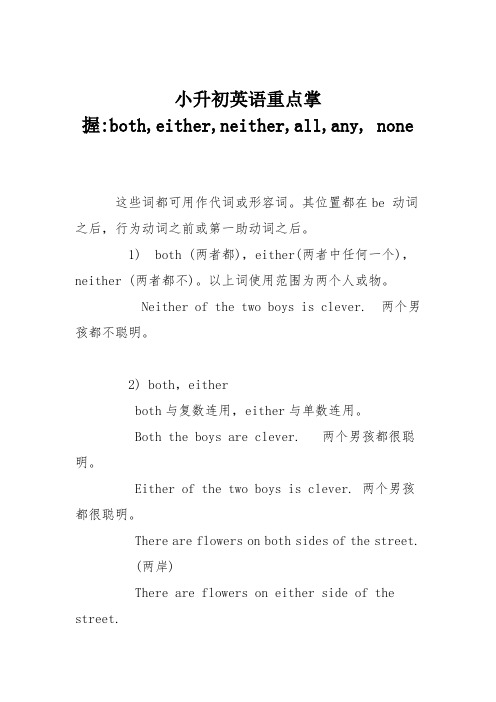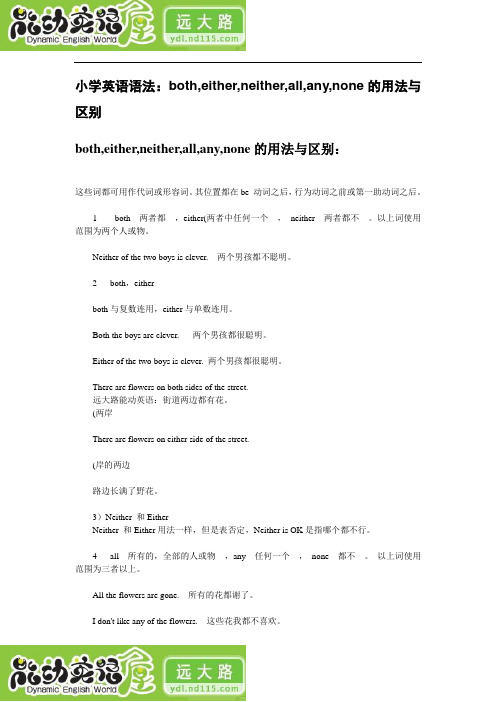小学英语语法:both,either,neither,all,any,none的用法与区别
- 格式:docx
- 大小:20.96 KB
- 文档页数:3

both neither either all none用法both、neither、either、all、none是英语中常用的词语,它们在句子中通常被用来表达两个或多个事物之间的关系或选择。
下面将详细介绍它们的用法。
1. bothboth表示两个事物都是如此,一般用于肯定句中。
例如:- Both Mary and John are good students.(玛丽和约翰都是好学生。
)- We can both speak English and French.(我们可以说英语和法语。
)2. neitherneither表示两个事物都不是如此,一般用于否定句中。
例如: - Neither Mary nor John is a doctor.(玛丽和约翰都不是医生。
)- I have neither time nor money to go on a trip.(我既没有时间也没有钱去旅行。
)3. eithereither表示两个事物之一,用于选择句中。
例如:- You can either go to the cinema or stay at home.(你可以去电影院或者呆在家里。
)- Either Mary or John will come to the meeting.(玛丽或约翰会来参加会议。
)4. allall表示所有的事物,一般用于肯定句中。
例如:- All the students in the class are Chinese.(班上所有的学生都是中国人。
)- We ate all the cake.(我们吃了所有的蛋糕。
)5. nonenone表示没有任何一个事物,一般用于否定句中。
例如:- None of the students in the class is American.(班上没有一个学生是美国人。
)- I have none of my own money left.(我没有一分自己的钱了。

英语不定代词表示两者和三者的语法一、表示两者的不定代词英语中表示两者的不定代词主要有三个:both, either和neither。
① both的意思是“两者都”。
注意体会以下句子:Would you like milk or sugar or both? 你是想要牛奶还是糖,还是两者都要?They have two grown children, both of whom live abroad. 他们有两个成年子女,都住在国外。
Oxford is not far from Stratford, so you can easily visit both in a day. 牛津与斯特拉特福相距不远,所以你可以方便地用一天时间参观这两个地方。
To know more about the British Museum, you can use the Internet or go to the library, or both. 为了更多地了解大英博物馆,你可以利用因特网或前往图书馆,又或两者一起(进行)。
② either 的意思是“两者中的任意一个”。
注意体会以下句子:Unfortunately I was sitting at the table with smokers on either side of me. 真倒霉,餐桌上坐在我两边的人都抽烟。
I’ve lived in New York and Chicago, but don’t like either city very much. 我在纽约和芝加哥都住过,但两个城市我都不太喜欢。
There were glasses of champagne and cigars, but not many of either were consumed. 这里有香槟和雪茄,但两样东西都没怎么动。
They are able to talk openly to one another whenever either of them feels hurt. 他们俩无论谁感觉受到了伤害,都能够向对方坦言相告。

all,both,none,every,each,either,neither,any区别1. 表示“全体”,可用all和both,但all表示三个或三个以上的人或物的“全体”,而both则表示两个人或物的“全体”。
例如:All the five students are from the USA.Both the two girls are pretty.表示“全体都不”且当全体为三个或更多的人或物时,通常用none。
例如:None of the students came to school late.上例中既可用none,也可用no one,但no one只能指人,不能指物。
下面一句的更换就是错误的:None of the books was yours.→No one was yours.如果表示两个人或物“都不”,通常用neither。
例如:Neither of the two students failed the exam.2.表示全体中的“每个”,如果这个“全体”包含三个或更多的人或物,通常用every。
例如:Every child in China should go to school.如果这个“全体”包含两个或两个以上的人或物,便可以用each。
例如:Each of the streets is full of trees.each与every的区别还在于every指许多人或物中的“每个”,侧重于全体,近乎all的涵义。
例如:Every student passed the exam.=All the students passed the exam.而each则指许多人或物中的“各个”,侧重于个别。
例如:Each student should have his own way to study.3.表示全体中的“任何一个”,也要看这个“全体”是包括三个或更多,还是只包含两个。

小升初英语重点掌握:both,either,neither,all,any, none这些词都可用作代词或形容词。
其位置都在be 动词之后,行为动词之前或第一助动词之后。
1) both (两者都),either(两者中任何一个),neither (两者都不)。
以上词使用范围为两个人或物。
Neither of the two boys is clever. 两个男孩都不聪明。
2) both,eitherboth与复数连用,either与单数连用。
Both the boys are clever. 两个男孩都很聪明。
Either of the two boys is clever. 两个男孩都很聪明。
There are flowers on both sides of the street.(两岸)There are flowers on either side of the street.(岸的两边)路边长满了野花。
3) all (所有的,全部的人或物),any (任何一个),none (都不)。
以上词使用范围为三者以上。
All the flowers are gone. 所有的花都谢了。
I don’t like any of the flowers.这些花我都不喜欢。
I like none of the flowers. 这些花我都不喜欢。
注意:all与none用法一样。
跟单数名词,用单数动词;跟复数名词,用复数动词。
All of the students are there.所有的学生都在那。
All (of) the milk is there.所有的牛奶都在那。

小学英语语法:both,either,neither,all,any,none的用法与区别both,either,neither,all,any,none的用法与区别:这些词都可用作代词或形容词。
其位置都在be 动词之后,行为动词之前或第一助动词之后。
1 both 两者都,either(两者中任何一个,neither 两者都不。
以上词使用范围为两个人或物。
Neither of the two boys is clever.两个男孩都不聪明。
2 both,eitherboth与复数连用,either与单数连用。
Both the boys are clever.两个男孩都很聪明。
Either of the two boys is clever. 两个男孩都很聪明。
There are flowers on both sides of the street.远大路能动英语:街道两边都有花。
(两岸There are flowers on either side of the street.(岸的两边路边长满了野花。
3)Neither 和EitherNeither 和Either用法一样,但是表否定,Neither is OK是指哪个都不行。
4 all 所有的,全部的人或物,any 任何一个,none 都不。
以上词使用范围为三者以上。
All the flowers are gone.所有的花都谢了。
I don't like any of the flowers.这些花我都不喜欢。
I like none of the flowers.这些花我都不喜欢。
注意:all与none用法一样。
跟单数名词,用单数动词;跟复数名词,用复数动词。
All of the students are there.所有的学生都在那。
All of the milk is there.所有的牛奶都在那。
相关练习:1.May I have two tickets, please? Sorry there’s ________ left. A. both B.neitherC.anyD.non .On ________ side of the road there are many white tall buildings. A.all B.bothC.eitherD.every3.Not ________ woman can do that kind of work. A.each B.every C.all D.both4. --Which would you like, a cup of tea or a glass of milk? --- ______. I think I’ll just have aglass of water. A. Both B. Neither C. None D. Either )5. Which sweater do you prefer, the yellow one or the pink one? -- ____. I like a light blueone. A. Either B. Both C. Any D. Neither6.____John ____ Jack may go with you because one of them must stay at home. . A.Neither;nor B. Both;and .C. Either;or .D. Not only;but also7. ______ of us has read the story,so we know nothing about it. .A. Some B. Both .C.None D. All8 Mary doesn't like dancing. _____.. A. Neither do I B. Either do I .C. So do I D. So I don't9—Can you come on Monday or Tuesday?—I'm afraid ___ day is possible. A. either B.neither C.some D. any10. There are many trees ______ of the road! And ___ of trees is growing larger and larger. A.on both side, a number B. on each sides, a number C. on both sides, the number D. on every side, the number。

none,either,neither,both用法"None", "either", "neither", "both"是英语中常用的四个单词,其用法如下:None"None"意为"没有任何一个",表示零或没有,常用于否定句和表示数量的语句中。
例如:None of the students passed the exam.(没有一个学生通过了考试。
)There are none left.(没有剩下的了。
)Either"Either"意为"任何一个",表示两个中的任何一个。
常用于否定句和选择疑问句中。
例如:I don't like either of these dresses.(我不喜欢这两件衣服。
)Do you want tea or coffee? Either is fine with me.(你想要喝茶还是咖啡?我都可以。
)Neither"Neither"意为"两者都不",表示否定选择。
常用于否定句和选择疑问句中。
例如:Neither of us knows the answer.(我们两个都不知道答案。
)Do you want to go to the park or the beach? Neither sounds good to me.(你想去公园还是海滩?我都不想去。
)Both"Both"意为"两者都",表示肯定选择。
常用于肯定句和选择疑问句中。
例如:Both of my parents are doctors.(我父母双方都是医生。
)Do you want to watch a movie or play video games? Both sound fun to me.(你想看电影还是玩游戏?我都觉得很有趣。
代词either、neither、both 、any、none和all等辨析1.There are two good hotels in the town.2.You can stay at either of them. 两者中的任何一个However,3.Neither of them had any rooms.两者都不4.Both of them were full.两者都5. There are many good hotels in the town.6. You can stay at any of them. 三者及以上中任何一个However,7.None of them had any rooms.三者及以上中都不8. All of them were full. 三者及以上都主谓一致情况:All of…谓语动词用复数Both of…/both …and…Eg: All of them were full.Both Hotel A and Hotel B were full.None of…Neither of…谓语动词用单数Either of…Any of…None of them was available.Neither of them was available.Either of them was full.Any of them was full.Either…or…不是…就是… 谓语动词遵循就近原则Neither…nor…既不….也不…1.Either you or she has a car.Neither you nor she has a car.2. Either you or they are from America.Neither you nor they are from America.考题链接:1.Old Mr.black lives happily with his three dogs. ____ of them are partof his family.(2014)A.BothB. AllC. NoneD. Neither2.____ Tony ____Frank likes the CDs. They think the music is toonoisy.(2012)A.Neither; norB. Either; orC. Both; andD. Not only; but also。
Both, either, neither, none, all 的用法Both, either, neither, none, and all are five important words in English language that are widely used. These words are used to express a variety of meanings depending on the context in which they are used. They are used in sentences to express ideas, convey information and make statements.BothBoth is a word that indicates the existence of two things, concepts, ideas, or people. It is used to describe two things that are together or in addition to each other. For example, if someone says "both my parents are doctors," they are expressing that both of their parents are doctors. The word both can be used as an adjective, pronoun, or adverb and it is mostly used when comparing two things.Examples:- Both cats are black.- We both enjoyed watching the movie.- Both the teacher and the student were confused.EitherEither is used to signify a choice between two options and it implies the presence of two possibilities. It can be used as a conjunction, determiner, or pronoun. For example, in a sentence like "you can either choose this or that," we have two options or possibilities.Examples:- I will go to either Paris or London for my vacation.- Either you come with us or stay at home.- I don't like either of them.NeitherNeither is another important word that is used in many situations. It is used to indicate that both of the options under discussion don't apply or aren't present. Neither can be used as an adjective, pronoun, conjunction, or adverb and it is mostly used when comparing two things.Examples:- Neither of them knew the answer.- She received neither praise nor criticism.- Neither option seems appealing.NoneNone is a word that means "not one" or "not any." It is often used when someone wants to express that something is lacking or there is an absence of something. None can act as a pronoun or an adverb.Examples:- None of the cakes were good.- He had none of his own ideas.- There is none left.AllAll is a word that indicates every individual or thing without exception. It is used to express the idea that one thing applies to everything in a certain group. All can be used as a pronoun, adjective, or adverb.Examples:- All of the students passed the test.- All the places I visited were magnificent.- I am all ready for the trip.In conclusion, Both, either, neither, none, and all are versatile words that are used in different contexts to express different meanings. Understanding their usage and how each word contributes to the sentence structure is important in becoming proficient in the English language.。
both neither either none的用法1、表示两者关系的both, either与neither这3个词都用来谈论两者:both意为“(两者)都”,either意为“(两者中)任意一个”,neither意为“(两者)都不”。
若要指三者或三者以上,分别用all意为“(三者)都”,any意为“(三者中)任何一个”,none意为“(三者)都不”等。
He has two sons. Both of them are clever. 他有两个儿子,都很聪明。
He has two sons. Either of them is clever. 他有两个儿子,哪个都很聪明。
He has two sons. Neither of them is clever. 他有两个儿子,两个都不聪明。
He has three sons. All of them are clever. 他有三个儿子,都很聪明。
He has three sons. Any of them is clever. 他有三个儿子,哪个都很聪明。
He has three sons. None of them are clever. 他有三个儿子,个个都不聪明。
2. 它们既可用作代词,也可用作形容词。
用作形容词时,both 后接复数名词,而 either 和 neither 之后要接单数可数名词。
如:1).Both of the brothers are here.=Both brothers are here. 兄弟俩都在这儿。
2).Either of the books is OK.=Either book is OK. 两本书中哪一本都行。
3).Neither of the stories is interesting.=Neither story is interesting. 两个故事都没有趣。
代词both, either, neither 用作主语时,both 之后的谓语动词总是复数,either和 neither 后的谓语动词通常用单数。
小学英语语法:both,either,neither,all,any,none的用法与区别both,either,neither,all,any,none的用法与区别:
这些词都可用作代词或形容词.其位置都在be动词之后,行为动词之前或第一助动词之后.1both两者都,either(两者中任何一个,neither两者都不.以上词使用范围为两个人或物.
Neither of the two boys is clever.两个男孩都不聪惠.
2both,either
both与复数连用,either与单数连用.
Both the boys are clever.两个男孩都很聪惠.
Either of the two boys is clever.两个男孩都很聪惠.
There are flowers on both sides of the street.
远大路能动英语:街道两边都有花.
(两岸
There are flowers on either side of the street.
(岸的两边
路边长满了野花.
3)Neither和Either
Neither和Either用法一样,但是表否定,Neither is OK是指哪个都不行.
4all所有的,全部的人或物,any任何一个,none都不.以上词使用范围为三者以上.
All the flowers are gone.所有的花都谢了.
I don“t like any of the flowers.这些花我都不喜欢.
I like none of the flowers.这些花我都不喜欢.
注意:all与none用法一样.跟单数名词,用单数动词;跟复数名词,用复数动词.All of the students are there.
所有的学生都在那.
Allofthe milk is there.
所有的牛奶都在那.
相关练习:
1.MayIhavetwotickets,please?Sorrythere’s________left.A.bothB.neitherC.anyD. non .On ________ side of the road there are many white tall buildings.
A.all
B.both
C.either
D.every
3.Not________womancandothatkindofwork.A.eachB.everyC.allD.both
4. --Which would you like, a cup of tea or a glass of milk? --- ______. I think I’ll just have aglass of water. A. Both B. Neither C. None D. Either)
5. Which sweater do you prefer, the yellow one or the pink one? -- ____. I like a light blueone. A. Either B. Both C. Any D. Neither
6.____John____Jackmaygowithyoubecauseoneofthemmuststayathome..A.Neith er;nor B. Both;and .C. Either;or .D. Not only;but also
7.______ofushasreadthestory,
soweknownothingaboutit. .A.SomeB.Both .C.NoneD. All
8 Mary doesn“t like dancing. _____.. A. Neither do I B. Either do I .C. So do I D. So I don“t9—Can you come on Monday or Tuesday?—I“m afraid ___ day is possible.A. eitherB.neither C.some D. any
10. There are many trees ______ of the road! And ___ of trees is growing larger and larger. A.on both side, a numberB. on each sides, a number C. on both sides, the numberD. onevery side, the number。